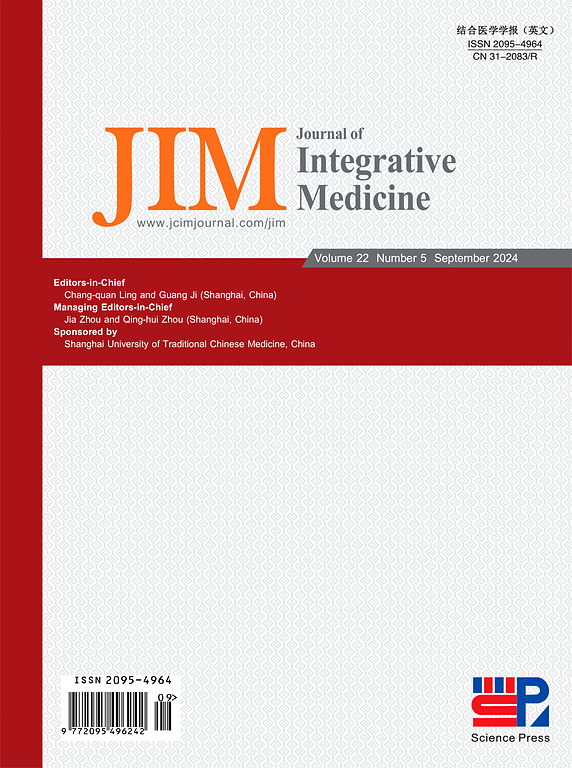血必净注射液受中性粒细胞与淋巴细胞血小板比值的影响可降低COVID-19患者的死亡率。
IF 4
2区 医学
Q1 INTEGRATIVE & COMPLEMENTARY MEDICINE
引用次数: 0
摘要
目的:血必净注射液已被推荐作为治疗COVID-19重型和危重型患者的方法。本研究旨在探讨中性粒细胞与淋巴细胞血小板比值(NLPR)与COVID-19严重程度及预后的相关性,以及XBJ对不同炎症状态下COVID-19患者预后的影响。方法:本研究是在中国武汉协和医院进行的回顾性研究。纳入了2022年11月1日至2023年2月1日期间入院的COVID-19患者。在预测COVID-19患者预后时,采用新的炎症指标,并通过Cox回归模型和受试者工作特征曲线评估其预后价值。此外,还计算了NLPR的临界值。采用相对风险模型和Cox回归模型检验血必净注射液对NLPR截止分层患者队列预后的影响。结果:本研究纳入了455名COVID-19患者,平均年龄72岁。多个炎症指标与预后密切相关,其中NLPR预测能力最强。NLPR≤3.29患者的死亡率为17.3%,是NLPR≤3.29患者的6.2倍。重要的是,向NLPR患者提供血必净注射液与60天全因死亡率降低相关。然而,在NLPR≤3.29的患者中,接受血必净注射液的患者生存率无明显改善。结论:NLPR是预测COVID-19患者预后最可靠的炎症标志物,可准确识别可能受益于血必净注射液的个体。廖敏,张丽娟,白丽娟,王瑞瑞,刘燕,韩娟,刘丽莲,齐宝玲。血必净注射液降低新冠肺炎患者中性粒细胞/淋巴细胞血小板比例的影响。集成医学[J];打印前Epub。本文章由计算机程序翻译,如有差异,请以英文原文为准。
Xuebijing injection reduces COVID-19 patients’ mortality as influenced by the neutrophil to lymphocyte platelet ratio
Objective
Xuebijing injection has been recommended as a therapeutic approach for individuals with severe and critical COVID-19. This study aims to explore the correlation of neutrophil to lymphocyte platelet ratio (NLPR) with the severity and prognosis of COVID-19, and the effect of XBJ on the prognosis of patients with COVID-19 in different inflammatory states.
Methods
This was a retrospective study conducted at Wuhan Union Hospital in China. COVID-19 patients admitted between November 1, 2022 and February 1, 2023 were included. In predicting prognosis for individuals with COVID-19, new inflammatory indicators were used, and their prognostic value was assessed by using Cox regression models and receiver operating characteristic curves. Furthermore, a calculation was made to determine the cutoff value for NLPR. Relative risk and Cox regression models were used to examine the effects of Xuebijing injection on prognosis in patient cohorts that had been stratified by the NLPR cutoff.
Results
This research included 455 participants with COVID-19, with a mean age of 72 years. Several inflammatory indicators were found to be strongly correlated with prognosis, and NLPR shows the greatest predictive power. Patients with NLPR > 3.29 exhibited a mortality rate of 17.3%, which was 6.2 times higher than in patients with NLPR ≤ 3.29. Importantly, providing Xuebijing injection to patients with NLPR > 3.29 was associated with a lower risk of 60-day all-cause mortality. However, there was no discernible improvement in survival among patients with NLPR ≤ 3.29 who received Xuebijing injection.
Conclusion
NLPR is the most reliable inflammatory marker for predicting prognosis among individuals with COVID-19, and can accurately identify individuals who may benefit from Xuebijing injection.
Please cite this article as: Liao M, Zhang LT, Bai LJ, Wang RY, Liu Y, Han J, Liu LH, Qi BL. Xuebijing injection reduces COVID-19 patients mortality as influenced by the neutrophil to lymphocyte platelet ratio. J Integr Med. 2025; 23(3): 282–288.
求助全文
通过发布文献求助,成功后即可免费获取论文全文。
去求助
来源期刊

Journal of Integrative Medicine-Jim
Medicine-Complementary and Alternative Medicine
CiteScore
9.20
自引率
4.20%
发文量
3319
期刊介绍:
The predecessor of JIM is the Journal of Chinese Integrative Medicine (Zhong Xi Yi Jie He Xue Bao). With this new, English-language publication, we are committed to make JIM an international platform for publishing high-quality papers on complementary and alternative medicine (CAM) and an open forum in which the different professions and international scholarly communities can exchange views, share research and their clinical experience, discuss CAM education, and confer about issues and problems in our various disciplines and in CAM as a whole in order to promote integrative medicine.
JIM is indexed/abstracted in: MEDLINE/PubMed, ScienceDirect, Emerging Sources Citation Index (ESCI), Scopus, Embase, Chemical Abstracts (CA), CAB Abstracts, EBSCO, WPRIM, JST China, Chinese Science Citation Database (CSCD), and China National Knowledge Infrastructure (CNKI).
JIM Editorial Office uses ThomsonReuters ScholarOne Manuscripts as submitting and review system (submission link: http://mc03.manuscriptcentral.com/jcim-en).
JIM is published bimonthly. Manuscripts submitted to JIM should be written in English. Article types include but are not limited to randomized controlled and pragmatic trials, translational and patient-centered effectiveness outcome studies, case series and reports, clinical trial protocols, preclinical and basic science studies, systematic reviews and meta-analyses, papers on methodology and CAM history or education, conference proceedings, editorials, commentaries, short communications, book reviews, and letters to the editor.
Our purpose is to publish a prestigious international journal for studies in integrative medicine. To achieve this aim, we seek to publish high-quality papers on any aspects of integrative medicine, such as acupuncture and traditional Chinese medicine, Ayurveda medicine, herbal medicine, homeopathy, nutrition, chiropractic, mind-body medicine, taichi, qigong, meditation, and any other modalities of CAM; our commitment to international scope ensures that research and progress from all regions of the world are widely covered. These ensure that articles published in JIM have the maximum exposure to the international scholarly community.
JIM can help its authors let their papers reach the widest possible range of readers, and let all those who share an interest in their research field be concerned with their study.
 求助内容:
求助内容: 应助结果提醒方式:
应助结果提醒方式:


